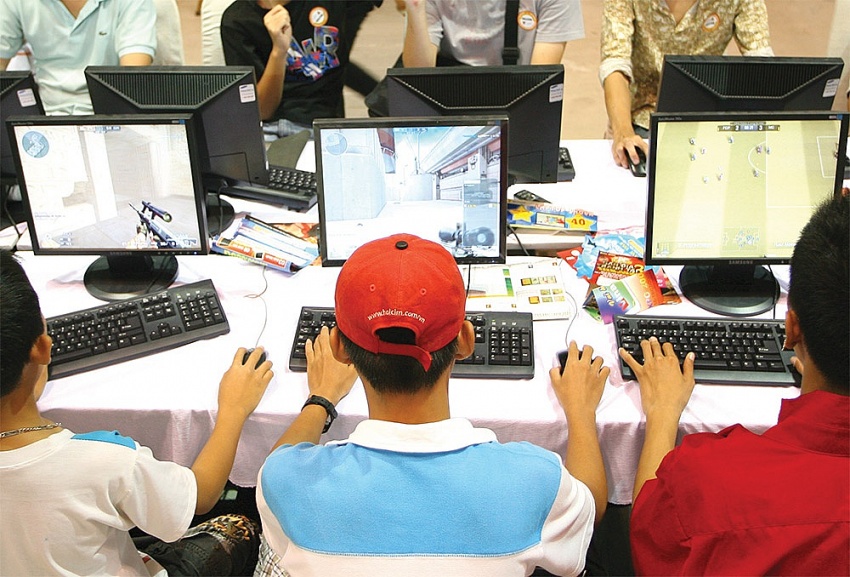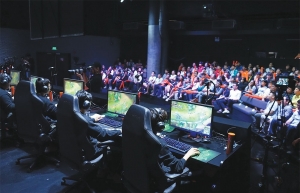Long-term product value vital for gaming industry
Zhen Fang, head of International at US online game platform Roblox, praised Vietnam as a “rising star” for user-generated content games at a gaming conference last week.
 |
| It has been tough for gaming startups based in Vietnam to garner significant profits, Photo: Le Toan |
“Beyond having a promising young user base that is both creative and open-minded, Vietnam also has the infrastructure ready to test cutting-edge technologies. Regulatory bodies provide policy support, collaboration opportunities, and infrastructure expansion,” she emphasised. “Vietnam is the most promising market in the region in terms of readiness, adaptability, and untapped potential.”
Along similar lines, Zuy Nguyen, international market development advisor of Games & Applications Southeast Asia at Google Asia-Pacific, said Vietnam boasts a young community of game developers who are fearless and eager to experiment with new ideas.
“Local programmers are particularly known for their entrepreneurial spirit, creativity, and ability to develop unique products. Games like Axie Infinity, which generated billions in revenue, are prime examples. Companies such as Amanotes, Topebox, and OneSoft each have their unique strengths, continuously innovating to remain competitive in the global market,” Nguyen said.
However, according to La Xuan Thang, director of Online Game Publishing at VNG, despite its vast potential and untapped opportunities, Vietnam’s online gaming industry has not yet met expectations, especially when compared to the population size and telecom infrastructure development of some neighbouring countries.
“Vietnamese games tend to have relatively short lifespans and do not yet meet global standards,” he stated. “Revenue remains modest, and the industry faces several issues, including societal prejudices, unfair competition, rampant piracy, and a declining number of gaming companies.”
Nevertheless, Thang also cited that the after-tax profit margins for Vietnamese gaming companies currently stand at only 3-5 per cent of revenue. Notably, Vietnamese firms account for just 22 per cent of the mobile gaming market’s revenue, with the remainder going to companies not headquartered in Vietnam. Overall, the country’s gaming industry revenue represents less than 0.5 per cent of the global total.
Discussing the potential for Vietnam’s gaming industry to integrate into the global value chain, Thang stressed the necessity of visionary leadership.
“Revenue isn’t everything. The long-term value of the products we create is what truly matters. Like other gaming companies, we are always eager to find great ideas and good products to serve users. Our short-term goal is to make money, but our greater aspiration is to gain global recognition,” he stated.
From a regulatory perspective, Le Quang Tu Do, director of the Broadcasting Authority at the Ministry of Information and Communications (MIC), highlighted the industry’s need for a solid foundation to realise its billion-dollar dream within the next five years.
“In the past year, the MIC and the Gaming Alliance have convinced the government to view gaming as a nurturing industry deserving of development incentives. Currently, the government has not only exempted the gaming industry from special consumption tax but also tasked the MIC with developing a strategy to provide further tax incentives,” Do explained.
Fostering connections with international businesses and investors is deemed vital. Policymakers have persuaded global partners such as Google, Meta, and Roblox to participate in events like Vietnam GameVerse, showcasing the potential and growth of Vietnam’s market.
“Last year, we dreamed of Vietnam’s gaming industry reaching a billion dollars. This year, we need to accelerate to turn that dream into reality,” Do of the MIC noted.
Phan Duc Trung, vice chairman of the Vietnam Blockchain Association, also believed in the importance of training in game programming, graphic design, and emerging technologies.
“Collaboration between businesses, universities, and research institutes is essential to create attractive working conditions that will attract and retain talent,” Trung said.
“Moreover, companies should also invest in research and development to enhance product quality and incorporate cutting-edge technologies such as VR, AR, and blockchain. Effective marketing strategies, leveraging social media, and pursuing international collaborations are key to expanding the market,” Trung said.
 | Billion-dollar gaming industry attainable Vietnamese game publishers are striving to rise up the ranks of the global gaming industry by holding on to top talent and encouraging modern thinking from legislators and potential consumers. |
 | VNG embraces technology to lead the gaming industry With recent developments in the gaming industry, VNG is quickening its digital transformation to keep its position and venture further into the international market. Giap Le Trong, head of the Game Publishing Platform at VNG Corporation, spoke to VIR’s Bich Thuy about the company's strategy and targets at the AWS Summit Singapore 2023. |
 | Vietnam temporarily exempts online gaming from special consumption tax Vietnam's government has delayed the decision to include online gaming services in the scope of the country's special consumption tax, leading to a sigh of relief from domestic industry stakeholders. |
 | Gaming industry potentially a billion-dollar market Vietnam's gaming industry, having generated over $600 million in revenue in 2022, is rapidly positioning itself as a potent player in the Southeast Asian market, according to data from a Vietnam Game Development Alliance report from October. |
What the stars mean:
★ Poor ★ ★ Promising ★★★ Good ★★★★ Very good ★★★★★ Exceptional
 Tag:
Tag:
Related Contents
Latest News
More News
- Kurz Vietnam expands Gia Lai factory (February 27, 2026 | 16:37)
- SK Innovation-led consortium wins $2.3 billion LNG project in Nghe An (February 25, 2026 | 07:56)
- THACO opens $70 million manufacturing complex in Danang (February 25, 2026 | 07:54)
- Phu Quoc International Airport expansion approved to meet rising demand (February 24, 2026 | 10:00)
- Bac Giang International Logistics Centre faces land clearance barrier (February 24, 2026 | 08:00)
- Bright prospects abound in European investment (February 19, 2026 | 20:27)
- Internal strengths attest to commitment to progress (February 19, 2026 | 20:13)
- Vietnam, New Zealand seek level-up in ties (February 19, 2026 | 18:06)
- Untapped potential in relations with Indonesia (February 19, 2026 | 17:56)
- German strengths match Vietnamese aspirations (February 19, 2026 | 17:40)






















 Mobile Version
Mobile Version